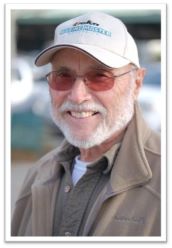
Donald William Rains
Professor of Plant Sciences, Emeritus
Dr. Rains enjoyed serving the campus and was active in outreach to the agricultural community. He was chair of Agronomy and Range Science on two occasions and was Director of the multidisciplinary UC Davis Plant Growth Laboratory, that hosted many innovative and fundamental plant science research projects. He also served as Chair of the International Agricultural Development Graduate Group and was instrumental in its rise to a world leading graduate program.
Dr. Rain’s interests in soil science, plant nutrition, and science started at a young age as he helped tend the crops and animals on the family farm in Iowa. In 1953, the family moved to Fresno, CA, where he found employment on the west side of the San Joaquin Valley. There he met landowners J.G. Boswell and Fred Salyer amongst others who were involved in development of the western San Joaquin agricultural enterprises.
Soon after locating to Fresno, the family moved to Culver City, CA where Bill graduated from Culver City High School in 1956. In his high school yearbook he wrote, “I plan to work for the University of California Agricultural Extension Service, assisting farmers with their problems.” Growing up on a farm and watching farmers struggle made an impression on Bill.
After high school, Bill attended Santa Monica City College and transferred to the Pierce School of Agriculture. In 1959 he enrolled at the University of California, Davis and graduated in 1961 with a BS degree in Soil Science. He was honored as the 1961 Outstanding Undergraduate Soil Science Student. Dr. Rains continued his graduate education at UC Davis studying ion absorption by plants culminating in seminal papers on the mechanism of potassium – absorption by roots. He studied with Dr. Emanuel Epstein who would become a life-long friend and collaborator even after both men retired.
Following his doctoral program, Bill was awarded a National Science Foundation Postdoctoral Fellowship to investigate soil and plant management in saline environments. He worked with Professor Andrew Benson at the Scripps Institute of Oceanography. At Scripps, Bill lectured on plant nutrition and spent three months on the research vessel, the Alpha Helix, that cruised to Australia’s Great Barrier Reef. On board, he examined the physiological response of mangroves to saline ocean waters. Plant responses to saline and stressful conditions remained a life-long interest of Dr. Rains. In 1966 he accepted a position in the Kearney Foundation of Soil Science where he continued to examine ion adsorption. In 1972, when the Kearney Foundation was disbanded, Dr. Rains was appointed by the Agronomy and Range Science Department where he investigated many topics including the use of azolla as an organic crop nutrient, efficient nitrogen fertilization of cotton and cereal crops, salt tolerance in cereal crops, sodium transport in plants, nitrogen and potassium nutrition of cereal crops and plant water stress. Professor Rains collaborated with many scientists and colleagues in the UC System, within Agronomy and Range Science and at other universities worldwide. One collaboration Bill found very satisfying was an investigation of mysterious horse deaths near Benicia, CA. Affected horses suffered from chronic lead poisoning leading to anemia and in some cases death. Bill demonstrated that the lead was derived from plants grown on contaminated pastures. The lead contamination was attributed to historical downwind sources.
Professor Rains particularly liked teaching, mentoring and advising students. Bill taught or team taught graduate and undergraduate courses in Agronomy, Plant Sciences, International Agricultural Development, and Soil Science. He served as a Master Advisor for Plant Sciences, the Agronomy Master’s Program, and the Agricultural and Environmental Graduate Group. Dr. Rains supervised and mentored a large number of graduate students, many of whom went on to distinguished careers in and out of academia.
Following retirement from Plant Sciences, Bill served the UC Davis Emeriti Association as president and board member. Bill collaborated with Professor Melvin George and Paul Gepts to compile an Agronomy and Range Science Department history. He also gave several lectures for the Osher Lifelong Learning Institute.
Bill was an ardent fisherman. He particularly enjoyed fishing in Lake Berryessa and the companionship of many friends that fished together every summer in Montana. He was a long-time Fly Fishers of Davis member and served as their president for two years. All who knew him appreciated and respected his love of life, sense of humor, dedication, loyalty, integrity and his enthusiastic and unapologetic support for UC Davis. He appreciated and found joy in the life he felt lucky to have led, and in those family, friends and colleagues he cultivated and in those who helped in along the way. He is survived by his wife, Gail; three children; five grandchildren; and nine great-grandchildren.
Robert J. Zasoski
Richard Plant
Calvin O. Qualset
Sham S. Goyal
R. William Breidenbach
